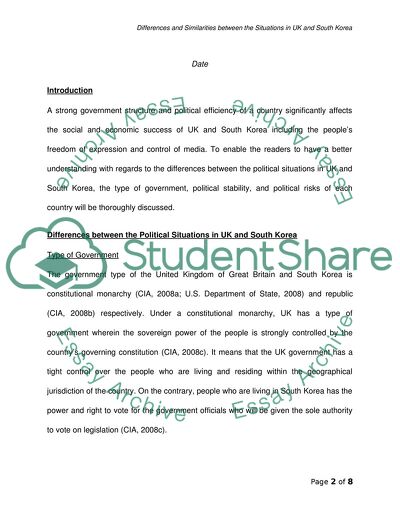
- Home
- Free Samples
- Premium Essays
- Editing Services
- Extra Tools
- Essay Writing Help
- About Us
- Studentshare
- Subjects
- Miscellaneous
- COMPARE POLITICAL SITUATION IN THE UK AND SOUTH KOREA
COMPARE POLITICAL SITUATION IN THE UK AND SOUTH KOREA - Essay Example

- Subject: Miscellaneous
- Type: Essay
- Level: Undergraduate
- Pages: 4 (1000 words)
- Downloads: 0
- Author: lunaemard
Extract of sample "COMPARE POLITICAL SITUATION IN THE UK AND SOUTH KOREA"
Department of State, 2008) and republic (CIA, 2008b) respectively. Under a constitutional monarchy, UK has a type of government wherein the sovereign power of the people is strongly controlled by the country’s governing constitution (CIA, 2008c). It means that the UK government has a tight control over the people who are living and residing within the geographical jurisdiction of the country. On the contrary, people who are living in South Korea has the power and right to vote for the government officials who will be given the sole authority to vote on legislation (CIA, 2008c).
UK citizens enjoy both the freedom of travelling and freedom of expression or the freedom of speech which has been noted under the European Convention on Human Rights and Fundamental Freedoms (ECHR). (Gibson, 2006; Barendt, 2005) However, the freedom of expression and the control of media has a limitation in the sense that the Office of Communication (Ofcom) – a statutory corporation that controls the media network throughout the United Kingdom has to consider not only the guidelines stated stated under the Communication Act 2003 which is also known as the ‘Comms Act’, the Freedom of Information Act which includes the codes and policies related to radio and television broadcasting, and the Data Protection Act of 1998 (Ofcom, 2008).
When it comes to UK’s freedom to travel, the country ‘rank 6’ such that people in UK can travel to as much as 152 countries around the world without the need of having a Visa based on Global Ranking 2006 (Henley & Partners, 2008). Similar to UK, South Korean citizens also enjoy both the freedom of travelling and a limited freedom of expression. In line with the control over media, an American journalist was imprisoned for criminal complaint ‘defamation charges’ against him by the Korea Times / Hankook Ilbo newspaper group back in January 1998 (Choi, 2008).
When it comes to South Korea’s freedom to travel, the country
...Download file to see next pages Read MoreCHECK THESE SAMPLES OF COMPARE POLITICAL SITUATION IN THE UK AND SOUTH KOREA
Economic Assessment: South Korea and North Korea
The Economic Success of South Korea
Financial Crisis in South Korea
Political and Strategic Contribution of Amphibious Operations - Korean War 1950-53
Business Culture and Norms - the UK and Korea
Economics Assessment of South Korea and North Korea
Causes of the Korean War
North Korea's Nuclear Program

- TERMS & CONDITIONS
- PRIVACY POLICY
- COOKIES POLICY